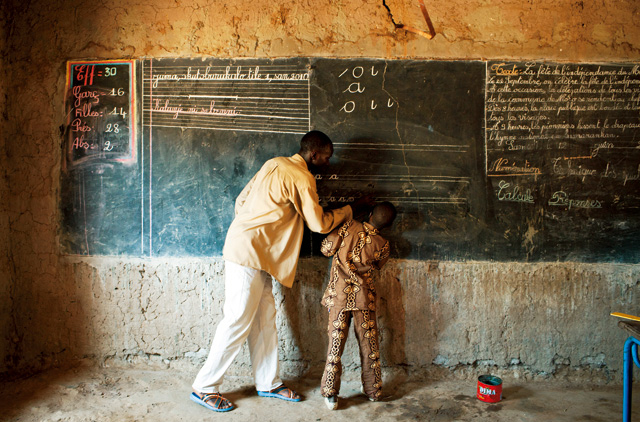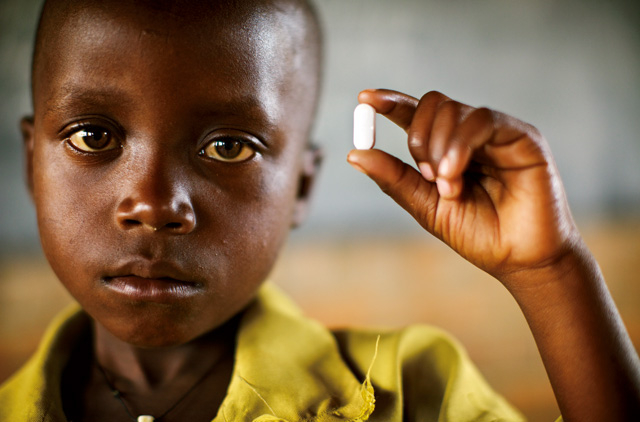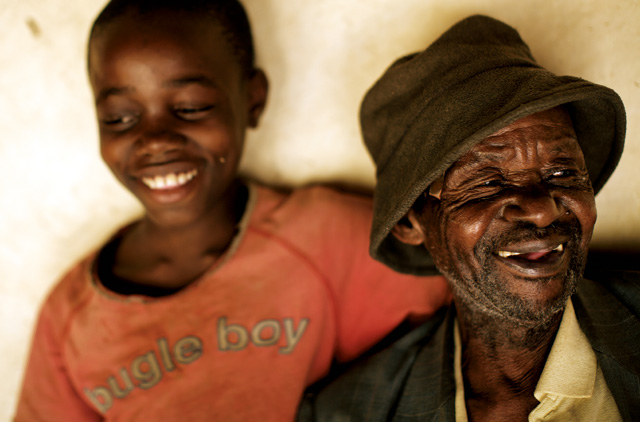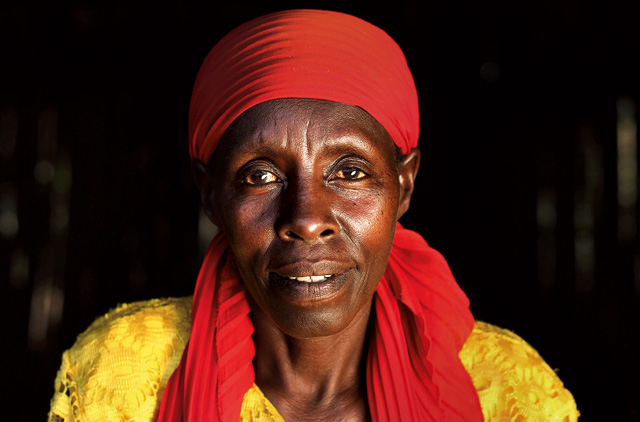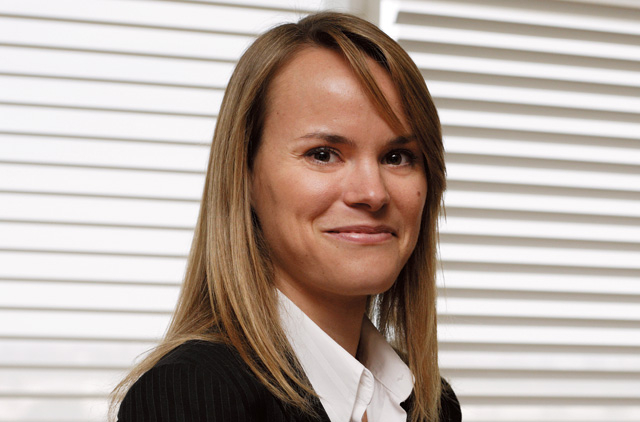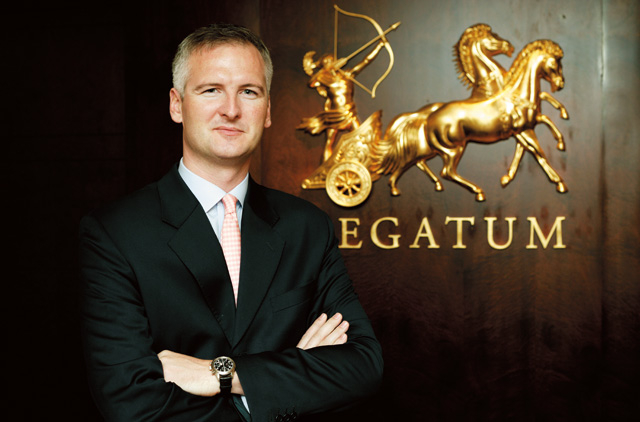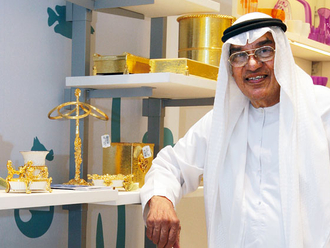
Seventy-eight-year-old Edward Koni stepped out of the St Paul's Mission Hospital in Laupula Valley, Zambia - known as The Valley of the Blind because of the high percentage of blindness from cataract, glaucoma, trachoma - and looked around.
He took a few hesitant steps then stopped. A faint smile played on his face as he twirled the cane he was carrying, one that had helped him find his way around for so many years. He looked at it for a moment, then raising his leg brought the cane down on his knee. With a sharp crack, it snapped in two. Koni looked at the pieces for a moment then flung them far away. He was sure he wouldn't need the cane again. The cataract he was suffering from had been surgically removed - thanks to the blindness prevention initiative of the Legatum Foundation, which provided a 30-bed eye ward at the hospital. "The light has come," he said to no one in particular, then shuffled home.
Across the Atlantic, in earthquake-stricken Haiti, the Foundation has embarked on a programme called Plant with a Purpose to help farmers whose crops were affected due to the landslides that were a regular occurrence in the hilly areas. One of the beneficiaries, Erod Mesidor from Acul du Nord, says, "Working with Plant with Purpose was a change in my life, in my wife and children's lives and in the life of the whole community. Before we had training in agriculture, there would be regular landslides, but the soil is holding up now. The whole hill is covered with trees that we planted. We now we have hope for the future."
Hidden potential unleashed
The future is something Alan McCormick, Managing Director of the Dubai-headquartered Legatum Group, strongly believes in.
"Our goal is to try and unleash the hidden potential of those [people] in very challenging circumstances. Recognising that philanthropy can only do so much, it is up to each person to do the rest," says McCormick.
The Legatum Group is a global investment company that promotes sustainable development of countries around the globe. It set up the Legatum Foundation in 2000 with a mission "to alleviate the misery of those living in abject poverty and elevate their basic living conditions" and McCormick is proud of the work his teams are doing.
The reason the group is headquartered in Dubai is simple: "The city is… one of the most dynamic financial centres of our times," says McCormick. "The strategic location here, midway between Asia and Europe, allows the company to cover the world's largest capital markets over a single business day."
The prime objective of the foundation is to allocate human, intellectual and financial resources effectively in the priority sectors; health, education, economic empowerment, human liberty, disaster recovery and environment.
Within a decade, the foundation has funded over 1,000 small, community-based organisations across the developing world.
McCormick had an international upbringing, living all over the world including Kuwait, Abu Dhabi, Colombia and India. He majored in Politics and History at the University of London and spent eight years marketing businesses in the capital markets before joining Legatum.
"My mother has, without a doubt, been a great source of inspiration to me. During my childhood she assisted many of the Vietnamese boat people relocating to the Derby [in the UK] area. When we lived in India, in Kolkata, she would volunteer with the Sisters of Mercy looking after street children," he says.
As a man who thoroughly enjoys his job, McCormick says, "My personal passion at Legatum is exploring the intersection between really great businesses and what creates development, or as some have said, ‘Doing well and doing good'. The one unifying desire around the world is people's hunger for jobs and opportunity.
"Aid by definition is not sustainable. Ultimately all communities need businesses. The Legatum Foundation is always trying to identify private sector solutions and create an enabling environment for entrepreneurs."
An investment approach
The Foundation invests in high-impact social entrepreneurs, often undiscovered, who are serving the poor in the world's hardest places. These bottom-up projects are clustered into a series of initiatives, each tackling specific problems in a given geographic location.
The Foundation provides humanitarian grants to support community-based projects run by local entrepreneurs. A major part of its mission is also to improve the effectiveness of the philanthropic marketplace by bringing the disciplines and tools associated with the capital markets to the development space. The Foundation takes an investment approach to philanthropy, trying to achieve the highest returns on investment through its grants.
"We seek to fund pioneering social entrepreneurs and try to advance fresh approaches that might attract further funding," explains McCormick. "This doesn't have to be complicated. This year we are backing the launch of a $100 million effort to bring about the reduction of neglected diseases in Africa, called the ‘END Fund'."
The Foundation requires that every grant demonstrates effectiveness, efficiency, and measurable results. It utilises the services of an advisory firm, Geneva Global, which vets each project and uses Legatum's unique proprietary reporting metrics to monitor and evaluate progress over the course of any given grant.
To tackle the issue of education in West Africa, the Foundation invested in ‘speed schools' a programme developed to provide education at grass-root levels.
"I love school," says Bintou, from Mali. She is a 20-year-old manual labourer and a mother. The teachers describe her as the most promising student of the class. "I thought I would never go to school as it was very expensive for my family and it is far away. I also have to participate in home duties but now that I go to school, there are fewer duties."
Kate Leaman, Senior Management Accountant at the Foundation, supports the Foundation in all aspects of financial reporting and processes. "There is a quote we use [at Legatum] which I feel sums up my hope for the future more succinctly than any other - ‘The most valuable thing in life is not what we get, but who we become.' I always try to keep this in mind when making decisions in my life," says Leaman.
She recollects her experiences of her recent trip to Africa for the Foundation's Africa Awards for Entrepreneurship. "I felt fortunate enough to meet the inspiring entrepreneurs supported by these awards. This trip also gave me and some of my colleagues a fantastic opportunity to meet some of the people the Foundation helps. We met street children, orphans and people living with HIV/Aids in Addis Ababa who, through our projects, are successfully re-building their lives.
"One lady in particular who invited us into her home and shared her story with us touched me deeply. Despite her infliction, she is now able to manage her health, is financially self-sufficient and is once again a respected member of her community, being actively involved in a peer-to-peer health education programme.
"We also attended a school Legatum has helped to fund in a slum in Nairobi. The provision of education to both children and adults is providing the community with the opportunities so many of us take for granted, and helping them carve a positive path for their futures. One particular memory which stands out for me from Nairobi was meeting the school librarian. She was a fantastically enthusiastic lady who has created a wonderfully serene library at the school in the midst of the bustling and noisy slum, where the children can read, draw and study in peace."
A celebration of hope
The Legatum Foundation has showcased a selection of its altruistic activities over the decade by releasing a book on its projects. Aptly titled RISE - Images of Life Change, this book encompasses the journey of nine photographers to eight countries to capture the changes in the life of the people who have benefited by the foundation. The countries involved were Zambia, Ethiopia, China, India, Burundi, Mali, Burma and Rwanda (where key projects of the foundation are implemented).
"This collection of photos and stories share a journey that celebrates hope in the midst of adversity," says McCormick. "In the summer of 2010, nine talented young photographers travelled over 50,000 miles to eight countries to highlight the millions of lives being changed largely as a result of individual endeavour and the community initiatives run by local people.
"It is the energy, courage and grace of these social entrepreneurs - the unsung heroes, in many cases volunteers - and their drive to rise up out of their current living conditions, that we celebrate in the publication of RISE."
Photographer Sanjit Das, who captured the women's healthcare scene in India as part of the project, was amazed by the people he met on his quest. "Sister Mary Elise from the Fakirana Sisters' Society is one of the most fascinating people I met," he writes in the book. "She has dedicated her whole life to the service of needy, sick, poor and the uneducated."
Sister Mary Elise was a volunteer for the Foundation's maternal health programme in Bihar. Proceeds from the sale of the limited-edition RISE photographs and the book will benefit the End Fund (www.endfund.org).
McCormick believes in the power of team spirit. "My role models and real inspiration are my colleagues here at Legatum - they are some of the most committed and accomplished people I have ever met. We learn from and support each other every day, building upon our long history and experience of investing around the world and channelling an amazing array of diverse talents towards promoting entrepreneurship, liberty and prosperity around the world," he says.
Leaman is astounded by the new lease of life she has helped people achieve. "One resounding feeling we were all left with after the trip to Africa was the overwhelming sense of pride and positivity the people we met held. The sense of pride at having been given the opportunity to move forward and take control of their own lives was fantastic."
Legatum Foundation projects include:
- The Global Network for Neglected Tropical Diseases, mainly in Burundi and Rwanda. Legatum's funding launched country-focused programmes with an integrated approach to disease prevention that included governments, the pharmaceutical industry and local partners. Legatum also facilitated the launch of the world's first integrated large-scale, multi-year, country-wide NTD study and associated follow-up programme, treating millions of people.
- It set up low-cost public schools in India and ‘speed' schools in west Africa.
- Over the past decade, Legatum has funded over 125 projects aimed at educating and rescuing those caught up in human trafficking and slavery in countries like Ghana and Ecuador.
- Its Disaster Recovery sector has aided projects like ‘The Invisible Children'.
- Legatum has granted over $1 million to the North Haiti Environment and Economic Empowerment programme.
For more information visit www.legatum.com
Making a difference
Who: Legatum Group
What: A global investment firm that promotes social and economic development in developing countries of Africa and Asia
How: By providing resources - financial and human - to local organisations


